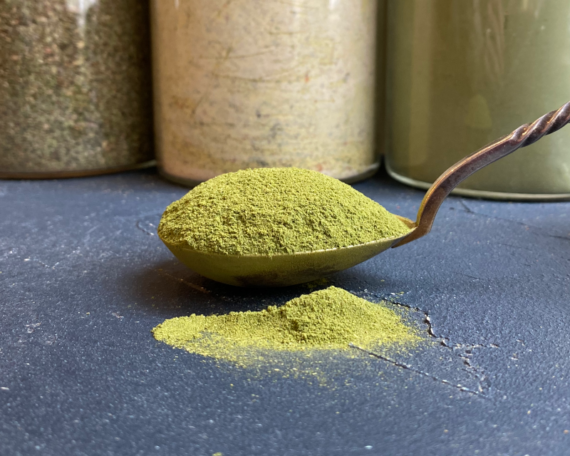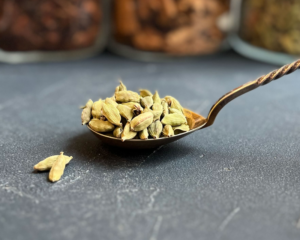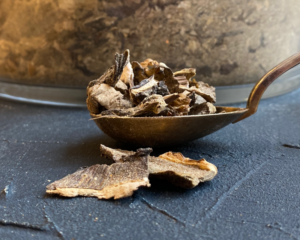Organic moringa leaf powder
From 2.30€
Moringa (Moringa oleifera), also known as the “miracle tree”, whose roots, stems, leaves, seed pods, resin and flowers have long been considered medicinal. Moringa is native to the Himalayan mountain region, especially in India, and later spread to Southwest Asia, Southwest and Northeast Africa, Madagascar, the Philippines and the USA.
Both moringa powder and dried moringa leaves come from the same source – the Moringa oleifera tree – but they differ in terms of preparation, texture and use.
Moringa has been used in Ayurveda for centuries. It is classified as an all-in-one plant – containing antibiotic, analgesic, antioxidant, anti-inflammatory, anti-inflammatory, anti-cancer, anti-diabetic, antiviral, anti-fungal and anti-ageing properties.
Moringa powder is made by drying fresh moringa leaves at low temperatures to preserve the nutrients. The dried leaves are then ground into a fine powder, thus preserving the nutrients.
Dried moringa leaves are obtained by air-drying fresh leaves until they become crisp and brittle. Like moringa powder, dried moringa leaves are rich in nutrients and contain essential vitamins and minerals. However, they may contain a slightly lower concentration of nutrients compared to the nutrient content of moringa powder.
Known as a superfood for its exceptional nutritional profile and health benefits, rich in essential vitamins, minerals and antioxidants, moringa powder is a natural and versatile addition to a healthy diet.
They contain vitamins including vitamin A, vitamin C, vitamin E and B-complex vitamins (e.g. B6, folic acid and riboflavin). It is also rich in minerals such as calcium, iron, potassium and magnesium. Moringa also boasts powerful antioxidants such as quercetin, chlorogenic acid and beta-carotene, which support overall health and strengthen the body’s defence against free radicals.
Health benefits of Moringa powder
Immunity support. The abundance of vitamins and antioxidants in moringa powder helps to strengthen the immune system and promote resistance to infection and disease.
Reducing inflammation. Moringa’s anti-inflammatory properties can help alleviate inflammation-related conditions such as arthritis and maintain joint health.
Improves brain function – The nutrients in Moringa powder, such as vitamin E and flavonoids, support brain health, cognitive function and may reduce the risk of neurodegenerative diseases.
Improved digestion. Moringa powder aids digestion by promoting healthy gut flora, relieving constipation and gastrointestinal discomfort.
Skin rejuvenation. The high content of vitamins A and E in Moringa powder can improve skin health and promote a youthful complexion.
Blood sugar regulation. Some studies suggest that moringa may help lower blood sugar levels, which is beneficial for people with diabetes or those at risk of insulin resistance.
Energy charge. The nutrient content of moringa provides natural energy support, fights fatigue and promotes vitality.
ECHO (Educational Concerns for Hunger Organisation) says: “Malnutrition is the leading cause of high infant mortality in the tropics. Moringa has helped provide for these hungry children and is considered one of the most nutritious plants in the world. It is an important source of nutrients for nursing mothers and developing children.”
Possible side effects of Moringa powder
Although moringa powder is generally safe to consume, excessive intake may cause minor side effects such as nausea, diarrhoea or stomach upset.
Pregnant or breastfeeding women, as well as people taking medication or with specific medical conditions, should take care before including moringa powder in their diet.
Moringa powder offers many health benefits, and can have a positive effect on overall well-being. Its excellent nutrient content and versatile use in a wide range of culinary applications make moringa powder an affordable and convenient way to increase the nutritional value of a healthy diet.
Use of
Moringa powder is very versatile and can be added to a wide range of dishes and drinks to increase their nutritional value.
Here are some simple ways to use moringa powder in your diet:
Smoothies – add a teaspoon of moringa powder to your favourite fruit or vegetable smoothie for extra nutrients.
Soups and stews – Add moringa powder to soups or stews just before serving to increase their nutritional value.
Salads – Sprinkle moringa powder on salads to increase the nutrient content, but this will add a mild, earthy flavour.
Baked goods – Add Moringa powder to muffins, pancakes or energy bars.
Tea – Steep moringa powder in hot water for a soothing and healthy herbal tea.
Finally, use moringa powder as a matcha and make yourself a cup of decaffeinated beverage.
The recommended daily intake is 3-6 g (1-2 teaspoons).
Let food be your medicine!
Sources:
https://www.webmd.com
https://www.mindbodygreen.com
NOTE. The information contained herein should not be construed as a recommendation for treatment or other health issues.
We encourage you to make personal decisions about your personal health, taking into account a wide range of sources of information.
100% Organic Moringa Leaf Powder (Moringa Olifera)
-
-



